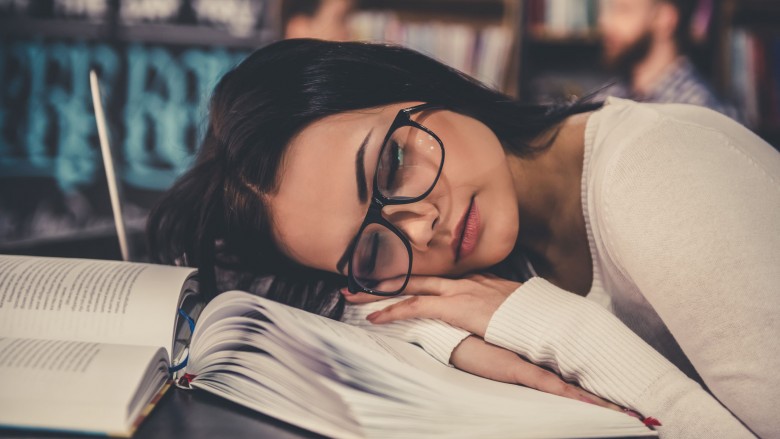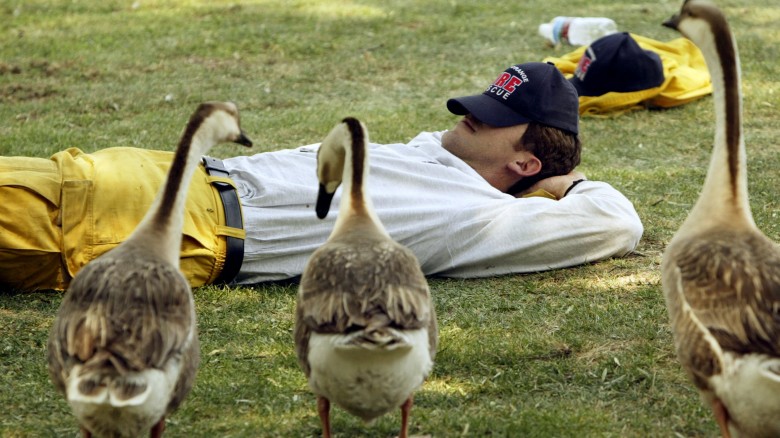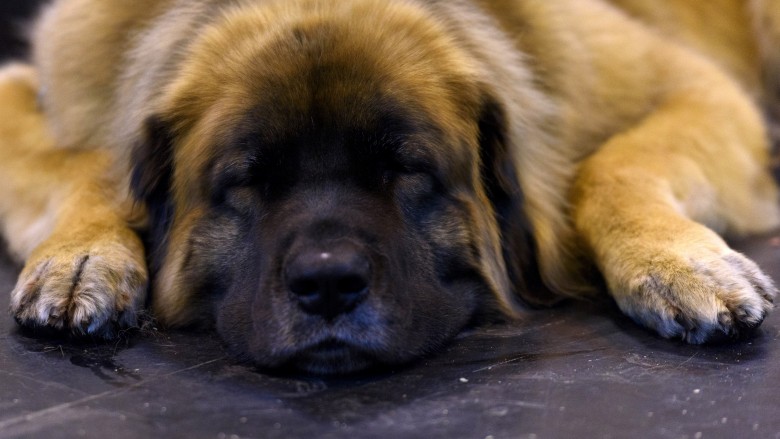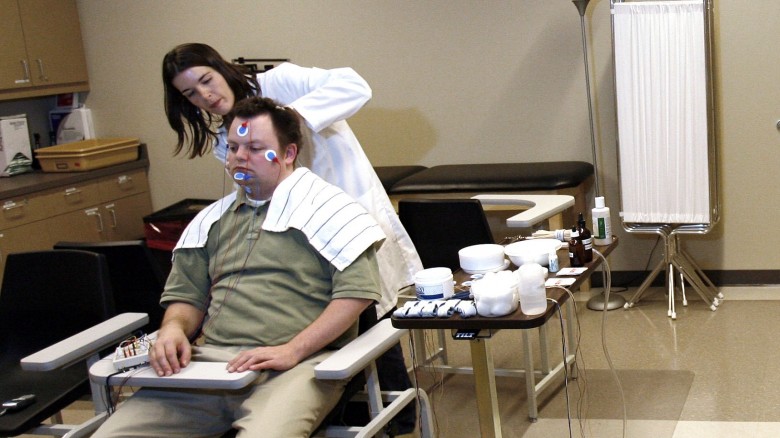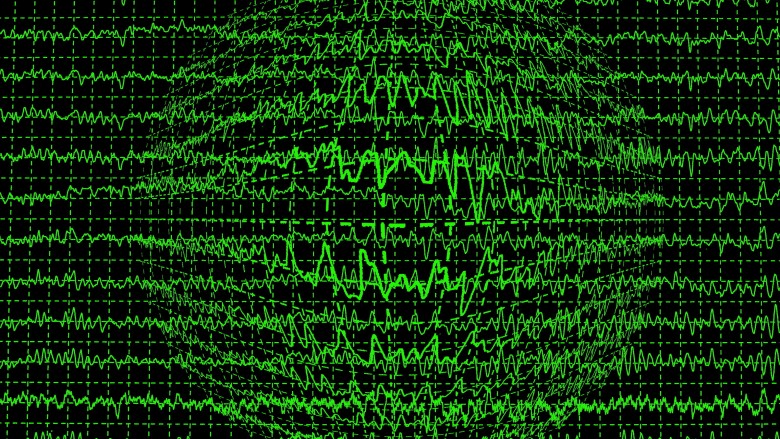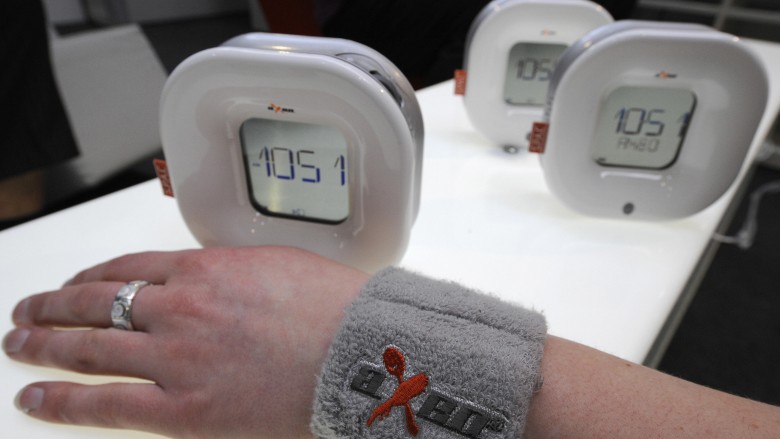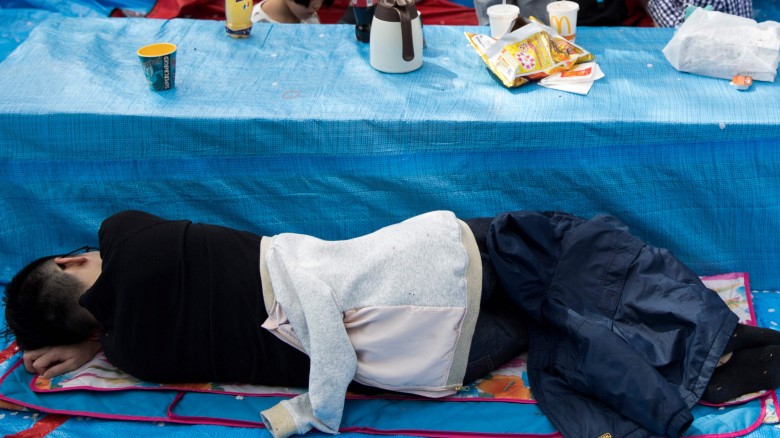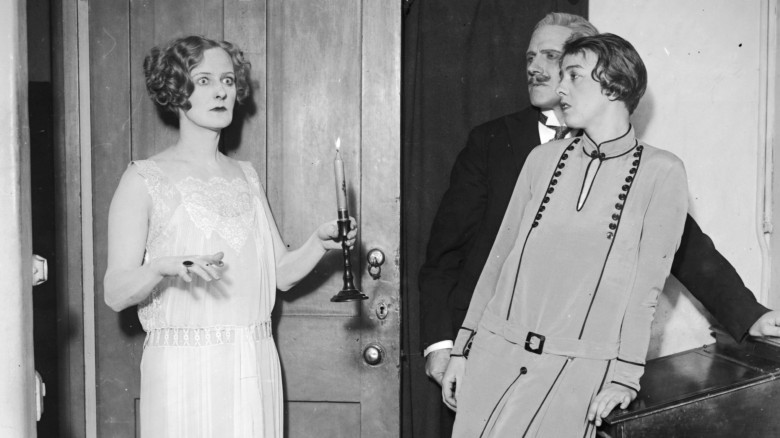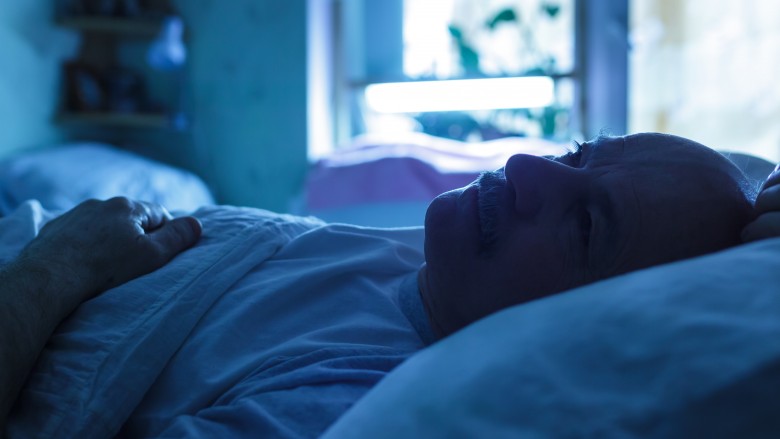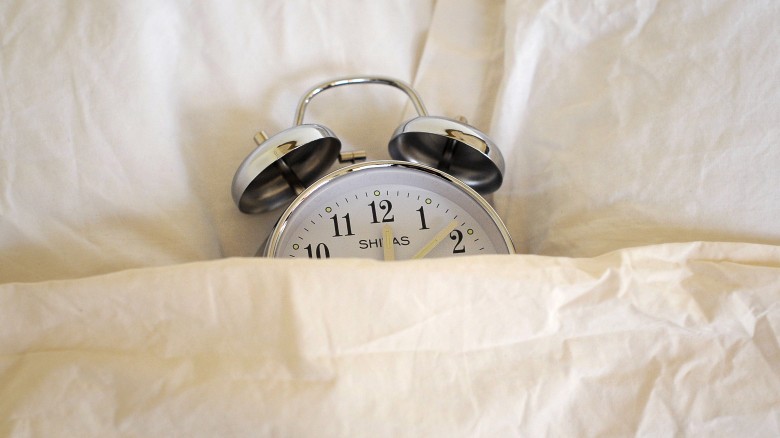Things About Sleep That Still Can't Be Explained
Since sleep is something we naturally know how to do since birth, you'd think we'd have it all figured out. But sleep is a real conundrum that we know surprisingly little about. There's a reason treating the nation's problem with sleep is so complicated. Turns out, sleep is still a big scientific mystery without many answers in sight.
Why do we sleep?
The most basic question of all, "Why do we sleep?," has turned out to be a real head scratcher for scientists. It's not that they haven't tried to figure it out, it's just that their research over the years has still not come up with a definitive answer.
Harvard Medicine published an article outlining some of the possibilities. The inactivity theory states that we evolved to sleep at night to protect us when we're most vulnerable. If a lion is out on the prowl, it wouldn't be great for us to be moving around and cooking a snack, whereas if we're silently sleeping, they may not see us. Of course, they could come and attack when we have no defenses, but that's conveniently not mentioned in the theory.
Another idea is we sleep to conserve energy. Back in the days when food wasn't available via app 24/7, we may have slept so that we weren't burning calories on high all day long. Now, sleep might be the one thing that stops us from eating every hour of the day. Or there's the possibility is that sleep affects brain plasticity, so your brain could be reorganizing itself while you snooze. Babies need to sleep 13–14 hours a day to intellectually develop, leading some scientists to believe brain plasticity is sleep's main function.
Lastly, it could be that sleep's primary goal is to restore the body. Muscle growth and repair happen almost entirely during sleep, and without sleep, you may never get around to such restorative processes at all. Plus, your brain is spending its day building up adenosine, a molecule leftover from cell activity. As adenosine builds up, we feel sleepy. Part of the reason caffeine keeps us awake is that it blocks the actions of adenosine. So, the molecule continues to build up until we give in and fall asleep. Then, the brain can do a little house cleaning, get rid of the extra adenosine and you wake up feeling alert again.
Why do all animals sleep?
A lot of the usual sleep theories break down when we see just how universal sleep is across animals with totally different lifestyles and body processes.
Every living thing sleeps. Mammals, cold-blooded animals, invertebrates—they all sleep. Hell, even vampires have to sleep, and they're undead and not real. This is particularly strange because there are so few things that vertebrates and invertebrates all do. Since we aren't sure why humans sleep, we aren't any closer to solving that mystery for the animal kingdom. But there have been some surprising developments on sleep research on fruit flies.
It turns out, fruit flies have very similar sleep patterns to humans, and researchers found some interesting links between genetics and sleep. By altering a single gene, we drastically altered flies' sleep patterns. Since their sleep cycles are similar to humans, wemay be able to isolate a human gene that would guarantee good sleep or wakefulness without the need of so many hours in bed.
Can lack of sleep kill you?
We know for sure that it's not a good idea to go without sleep for a long period of time. You probably learned that lesson after one too many all-nighters in college when you started hallucinating that your professor was a bear. But we're not 100-percent sure lack of sleep alone will kill a human.
Slate reported that staying awake will pretty likely end in your demise, based on Allan Rechtschaffen's rat studies from the 1980s. Rechtschaffen kept rats awake, and they all died within 32 days. Researchers don't agree on the physical cause of death. Some think the rats' temperatures dropped too low, others think their weakened immune system left them susceptible, or they could have died from their stress levels being too high or weight being too low.
Still, that doesn't conclusively mean humans would follow suit. Rats and humans are different, as evidenced by our lack of desire to live in walls and be super creepy and gross. But you can't really do a human study to keep a person awake until they die, so we don't have a lot of info.
The closest thing to a study that we have is from the CIA's use of sleep deprivation as a form of interrogation. They would keep prisoners awake for as long as 11 days, and the Justice Department reported "surprisingly, little seemed to go wrong with the subjects physically." Now, these prisoners weren't monitored for the detailed inner workings of their bodies, and many argue that severe problems may have developed that didn't show physical symptoms, but despite their lack of sleep, no prisoner ever died from it. This interrogation technique isn't allowed anymore, and since no one will likely volunteer for a scientific study of how long they can stay awake until they awake until they die, we'll probably never know for sure.
Why did dreaming evolve?
Researchers understand the physical process of dreaming, but why would dreams evolve? How necessary is it that we spend time in bed imagining tests we aren't prepared for or our teeth falling out? Well, Ionnanis Tsoukalas has an idea.
Tsoukalas, of the University of Sweden, published a hypothesis stating that REM sleep (the sleep cycle when dreaming occurs) evolved out of tonic immobility, or the "playing dead" reflex. As a last resort, animals will reflexively faint or pretend to be dead in hopes that their predator doesn't want to deal with a gross dead body. Psychology Today states that both tonic immobility and REM sleep show decreased muscle tone, changed heart rate, a change in brain chemistry, and rapid eye movement and twitching. With so many similarities, Tsoukalas concludes that REM sleep has evolutionary similarities to playing dead.
This is still just a theory and not a conclusive answer to why dreaming evolved. And it still doesn't explain we show up to public places nude in so many dreams, so there's a lot left to know.
Why is REM sleep important?
So, if we aren't sure how dreaming came to be, it's probably not that big of a deal, right? Sadly, no. The stage of REM sleep is incredibly important, but again, we don't know why.
In that good old rat test by Rechtschaffen, he not only kept rats awake, but he did a separate study where he let them sleep but never let them reach the REM cycle. Most of the rats died in two weeks from complete sleep deprivation, but non-REM sleep wasn't much better. The non-dreaming rats died in about a month, though they were allowed some sleep.
The Telegraph interviewed Adrian Williams, a professor of sleep medicine, who gave a few ideas as to why REM was so important. Williams cited Francis Crick, a co-discoverer of the DNA double helix: "His idea was that non-REM sleep is for repairing the body, and REM sleep is for rewiring the brain. The brain is very active during REM sleep. It uses as much oxygen as it does while it's awake." So, whenever you have a scary dream about falling off a cliff or having to watch Jack and Jill, know that it may somehow be helping your brain repair.
How much does the average American sleep?
This question seems incredibly easy to answer, but alas, it's not.
In 2013, Gallup and the Department of Labor both did polls to find out how long the average American sleeps. Gallup came up with six hours and 48 minutes. The Department of Labor arrived at eight hours and 42 minutes. That's not even close! It's a little like saying, "The polls say in this election say you'll either win by 12 percent or lose by 50 percent."
The New York Times figured the discrepancy might come from people reporting how long they were in bed for one poll, including non-sleeping moments, while in the other poll, they reported just the actual hours asleep. Plus, people are generally terrible at self-reporting. In a Department of Labor report from 2011, they found that people who thought they worked 40 hours really only worked 37, and big shots who felt they worked 75 hours a week really only worked 50. So, that makes it really hard to find out how much sleep people are really getting.
Why does lack of sleep lead to weight gain?
A Nurses' Health Study found that women who slept five hours or less per night were 15 percent more likely to become obese. The Harvard School of Health gives a few reasons for why this might be. Sleep-deprived folks might be too tired to exercise, or they eat more simply because they're awake more hours of the day. Also, lack of sleep messes up the hormones that regulate hunger, so the sleepy people might feel greater hunger than those who are well rested.
That could all be true, but once again we go back to Rechtschaffen's rat test. Adrian Williams summarized what happened to the completely sleep-deprived animals: "They all died of weight loss, within two weeks, despite eating more than usual." So, there's a link between weight and sleep that no one has quite figured out. But it can go in either of two totally different directions, muddying every theory we have on the subject.
What's going on when you sleepwalk?
For a long time, it was common knowledge that sleepwalkers never remembered anything while they were sleepwalking, that anything they did on the walk was just random, and a night fun stroll wouldn't interrupt your wakefulness during the day. Well, none of that might be true. The University of Montreal reviewed years of studies on sleep walking and found a lot of the info about it turned out to be false.
Researchers found that some people remembered their sleepwalking episodes and some didn't. The recall varied greatly, so to say that "no one remembers" is certainly false. Then, a somnambulist doesn't always do totally random stuff while on a midnight walkabout. Many people had rational reasons for doing whatever they were doing during the walk, though some still did weirdo things that would be great YouTube fodder if their partner pulled out a camera.
Also, the idea that sleepwalking won't affect you in the daytime? Not true. 45 percent of somnambulists reported feeling tired during the day. That seems like a real "no duh" situation since they were spending 30 minutes of the night pretending to fold clothes in the kitchen, but tiredness when the Sun is out doesn't affect every sleepwalker. Basically, nothing about sleepwalking is the same for every person, so we don't really know what's going on when you take a zombie walk under the stars.
Scientists aren't sure if people should sleep through the night
Well, if we know anything about sleep, it's that we should definitely sleep through the night. Oh wait, nope, it looks like there's debate about whether we should try to sleep in one long block at all.
Roger Ekirch, a sleep historian, found that sleeping in one big chunk is totally unnatural for humans. In pre-Industrial times, he says, "Humans slept in two four-hour blocks, which were separated by a period of wakefulness in the middle of the night lasting an hour or more. During this time, some might stay in bed, pray, think about their dreams, or talk with their spouses. Others might get up and do tasks or even visit neighbors before going back to sleep."
Before electricity, we spent a lot of time in darkness, so if you didn't have money for tons of highfalutin candles or gas lamps, you'd probably go to sleep to wile away your time in the darkness. But since we don't naturally need to sleep 14 hours a night, people would wake up, do a little nighttime business, and head back to sleep till sunrise. But electricity changed all that.
With easily available light and the post–Industrial Revolution work schedule, we switched to the nighttime block of sleep we adhere to today. Scientist Thomas Wehr conducted a study in the '90s where he exposed people to 14 hours of darkness, and after a while, they started sleeping in two separate sections. So, if you wake up during the night, you may be more in tune with your ancient human self than those around you.
How long should we sleep?
Everybody says we should all aim for eight hours of sleep a night unless you're a baby or some kind of sloth. But even that we don't know for sure.
A study from UC San Diego found that people who slept more than seven and a half hours a night had a higher risk of mortality than those who slept six and a half hours. Now, they also found if you significantly slept less than five hours, that was bad too, but not much worse than getting too much sleep. The sweet spot was five to six and a half hours for best mortality rates.
But on the complete opposite side of the spectrum, you also have articles in things like the Harvard Business Review that say it's incredibly important to get at least seven hours of sleep. Those researchers insist your brain must have seven to eight hours to give the brain enough time for restoration. If you get less, you're risking impaired cognitive function.
So, eight hours of sleep might lead to an early death or be necessary to live a productive life. It's one of the two.
